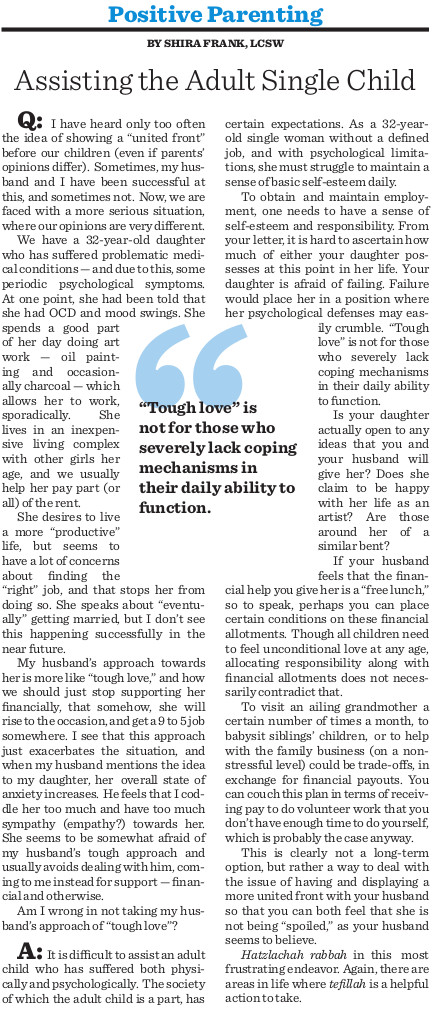Q: I have heard only too often the idea of showing a “united front” before our children (even if parents’ opinions differ). Sometimes, my husband and I have been successful at this, and sometimes not. Now, we are faced with a more serious situation, where our opinions are very different.
We have a 32-year-old daughter who has suffered problematic medical conditions — and due to this, some periodic psychological symptoms. At one point, she had been told that she had OCD and mood swings. She spends a good part of her day doing art work — oil painting and occasionally charcoal — which allows her to work, sporadically. She lives in an inexpensive living complex with other girls her age, and we usually help her pay part (or all) of the rent.
She desires to live a more “productive” life, but seems to have a lot of concerns about finding the “right” job, and that stops her from doing so. She speaks about “eventually” getting married, but I don’t see this happening successfully in the near future.
My husband’s approach towards her is more like “tough love,” and how we should just stop supporting her financially, that somehow, she will rise to the occasion, and get a 9 to 5 job somewhere. I see that this approach just exacerbates the situation, and when my husband mentions the idea to my daughter, her overall state of anxiety increases. He feels that I coddle her too much and have too much sympathy (empathy?) towards her. She seems to be somewhat afraid of my husband’s tough approach and usually avoids dealing with him, coming to me instead for support — financial and otherwise.
Am I wrong in not taking my husband’s approach of “tough love”?
A: It is difficult to assist an adult child who has suffered both physically and psychologically. The society of which the adult child is a part, has certain expectations. As a 32-year-old single woman without a defined job, and with psychological limitations, she must struggle to maintain a sense of basic self-esteem daily.
To obtain and maintain employment, one needs to have a sense of self-esteem and responsibility. From your letter, it is hard to ascertain how much of either your daughter possesses at this point in her life. Your daughter is afraid of failing. Failure would place her in a position where her psychological defenses may easily crumble. “Tough love” is not for those who severely lack coping mechanisms in their daily ability to function.
Is your daughter actually open to any ideas that you and your husband will give her? Does she claim to be happy with her life as an artist? Are those around her of a similar bent?
If your husband feels that the financial help you give her is a “free lunch,” so to speak, perhaps you can place certain conditions on these financial allotments. Though all children need to feel unconditional love at any age,allocating responsibility along with financial allotments does not necessarily contradict that.
To visit an ailing grandmother a certain number of times a month, to babysit siblings’ children, or to help with the family business (on a non-stressful level) could be trade-offs, in exchange for financial payouts. You can couch this plan in terms of receiving pay to do volunteer work that you don’t have enough time to do yourself, which is probably the case anyway.
This is clearly not a long-term option, but rather a way to deal with the issue of having and displaying a more united front with your husband so that you can both feel that she is not being “spoiled,” as your husband seems to believe.
Hatzlachah rabbah in this most frustrating endeavor. Again, there are areas in life where tefillah is a helpful action to take.

